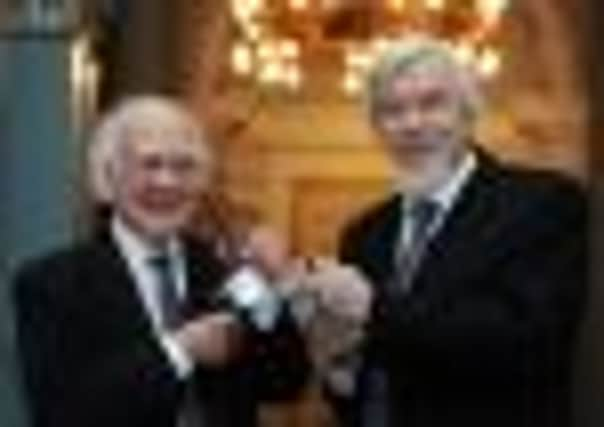Professor Peter Higgs awarded the Edinburgh Medal


Professor Peter Higgs was given the Edinburgh Medal at a ceremony in the Scottish capital yesterday to recognise his contributions to the fields of science and technology.
The professor hit upon the concept of a “God particle” during a walk in the Cairngorms in 1964, when he started to consider the existence of a particle that gives matter its mass.
Advertisement
Hide AdAdvertisement
Hide AdHe wrote two scientific papers on his theory which were published in the Physical Review Letters journal, sparking a 40-year hunt for the particle that became known as the Higgs boson.
Last July, a team from the European nuclear research facility (Cern) in Geneva, Switzerland announced the detection of a particle that fitted the description of the elusive Higgs boson.
Scientists used the world’s biggest atom-smashing machine, the £2.6 billion large hadron collider on the Swiss-French border, to confirm Prof Higgs’s theory.
The Edinburgh Medal was given jointly to Prof Higgs and Cern at a ceremony at Edinburgh’s Signet Library yesterday evening.
The professor, who has retired from Edinburgh University, was made a Companion of Honour in the New Year Honours list, and the Higgs Prize was set up by the Scottish Government to recognise school pupils who excel in physics.
Prof Higgs said: “The first medal, in 1989, was awarded to Abdus Salam, in whose group I was a research fellow 55 years ago and whose Nobel-winning theory a decade later made use of the ideas which had been proposed in 1964 independently by groups in Brussels and London and by myself in Edinburgh.
“Thus the fields of research for which the medal has been awarded have come full circle.”
The Edinburgh Medal is given each year to those judged to have contributed to the understanding of science and technology. Previous recipients have included three Nobel Prize winners.
Advertisement
Hide AdAdvertisement
Hide AdProfessor Rolf-Dieter Heuer, director general of Cern, collected the medal on behalf of the institution.
He said: “Postulating the boson back in the 1960s was an intellectual tour de force. Finding it has been a real community effort involving literally thousands of people from around the world working together for many years. The discovery is of vital importance to science, and is a major step in understanding the universe we live in.”
Dr Simon Gage, director of the Edinburgh International Science Festival, said: “The 25th anniversary of both the Edinburgh Medal and the Edinburgh International Science Festival seemed a fitting year to celebrate the importance of scientific collaboration.
“The endeavours of scientists are commonly focused on global if not universal phenomena. Collaboration is the natural way to progress quickly, and when it comes to such momentous efforts as those undertaken by Cern, it is the only way.”
In 2011, Prof Higgs was given the Edinburgh Award at the City Chambers, an accolade which recognises an outstanding contribution to the city.
The scientist, who was born in Newcastle-upon-Tyne, follows writers Ian Rankin and JK Rowling, cyclist Sir Chris Hoy and judoka George Kerr to the Edinburgh Award.
A sculpture of Prof Higgs’s handprints was also unveiled in the City Chambers quadrangle. They were engraved in Caithness stone alongside those of the earlier award recipients.